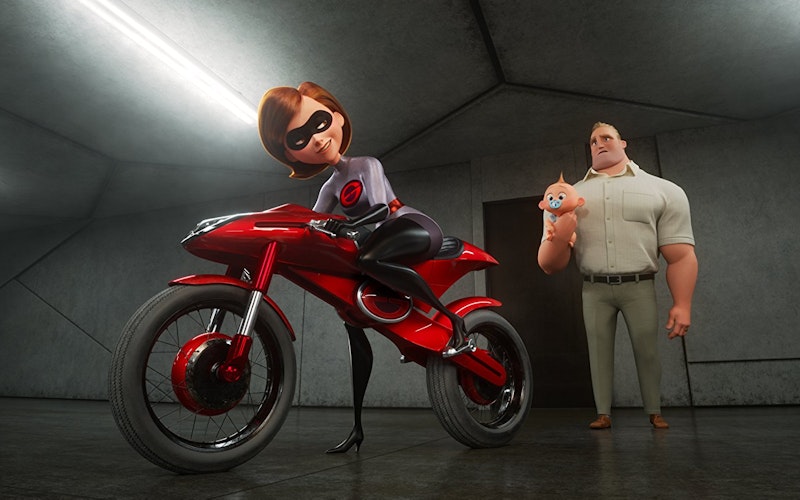
Movies
Incredibles 2 and Agency in the Church
In Incredibles 2, Elastigirl gets a cool new bike. The first time she revs its engine in the family garage, her husband, Mr. Incredible, forlornly watches while holding their toddler Jack-Jack. It’s not just that he no longer owns his own super vehicle (the “Incredobile”). It’s also that Elastigirl has been tapped to be the face of a superhero publicity campaign. Helen—I mean, Elastigirl—is getting to play the part her husband Bob had been used to playing, and she gets to do it with a new toy, to boot.
Like 2004’s The Incredibles, Incredibles 2 will strike a chord with parents everywhere because of the way it humorously exaggerates the joys and challenges of family life. (This time, Jack-Jack’s growing powers lead to a Looney Tunes-style dustup with a backyard raccoon.) By having Bob and Helen Parr flip traditional gender roles, Incredibles 2 might be especially resonant for families who had their domestic dynamic upended during the Great Recession, as laid-off husbands and fathers manned the fort while wives and mothers went to work. In a similar vein, I can think of another group for whom the movie might be enlightening, and maybe even instructive: churches with women in leadership roles traditionally held by men.
On her first mission, Elastigirl must rescue passengers who are trapped on a runaway bullet train. She pursues the train on her Elasticycle but can’t keep up. Playing with the bike’s features, she realizes that it’s able to split in two so that when she stretches (her super power) her arms can stay with the front half of the bike while her legs stay with the back. This enables her to slingshot herself, while still cycling, towards the train and ultimately save the day. Had Mr. Incredible been on the scene, the outcome probably would have been the same (although it’s worth noting that Elastigirl’s sponsors chose her because Mr. Incredible tends to leave too much destruction in his wake). But he certainly would have saved the day in a different way.
It’s not that Mr. Incredible and Elastigirl support each other and serve their fellow citizens by performing different roles; rather, they do so by performing the same role in different ways. The reason this works is because they’re both set up to succeed. While stopping the bullet train, Elastigirl is given the tools she needs to accomplish her mission. Her bike is explicitly designed to take advantage of her particular gifts. If Mr. Incredible hopped on, he’d probably crush it.
Mr. Incredible and Elastigirl serve their fellow citizens not by performing different roles, but by performing the same role in different ways.
When it comes to women in ministry, it’s not the roles or rules that need to be assigned according to gender; rather, gender might help us think about how we define those roles and rules. Are our church structures conceived and constructed to allow both men and women to succeed in top positions? Are our definitions of leadership, our hierarchies of authority, our models of governance all designed in ways that enable women, as much as men, to employ their particular spiritual gifts? In other words, are we giving women in ministry the Elasticycles they need?
I’ve heard the preaching of male pastors and female pastors and have benefited from both. Sometimes, though not always, a woman pastor has been able to illuminate God’s word for me specifically because she drew on her experience as a woman. In those instances, my understanding of the Good News was enriched in a way that a male preacher likely couldn’t muster, no matter how incredible he might be. As a male, hearing a woman preach expands my horizons by casting light from a place beyond my experience. It puts the gospel in a context I’d likely miss while speeding along in my manly Incredobile.
Perhaps I’m benefiting from what Barbara Brown Taylor, a noted female theologian and preacher, described in a 2016 interview: “...there is no getting around the fact that Christianity was born in a world where the masculine was ascendant and the feminine was assigned to serve. So yes, one tires of calling God ‘Father’ and wondering where the Mother went. That is why it is so important to have women in ministry—because they embody the sacred feminine that is missing from much of Scripture and tradition.”
I’ve found my experiences with male and female preachers to be different but equally valuable. It makes me think again about that early scene in Incredibles 2, where Elastigirl shows off her new bike in the family garage before leaving her husband to tend to the kids. After the forlorn look on his face fades, Mr. Incredible says to her, “You will be great.” She confidently replies, “I will be great, and you will too.” Pushing the button to open the garage door, he agrees: “We will both be great.”
Just not exactly the same.
Topics: Movies